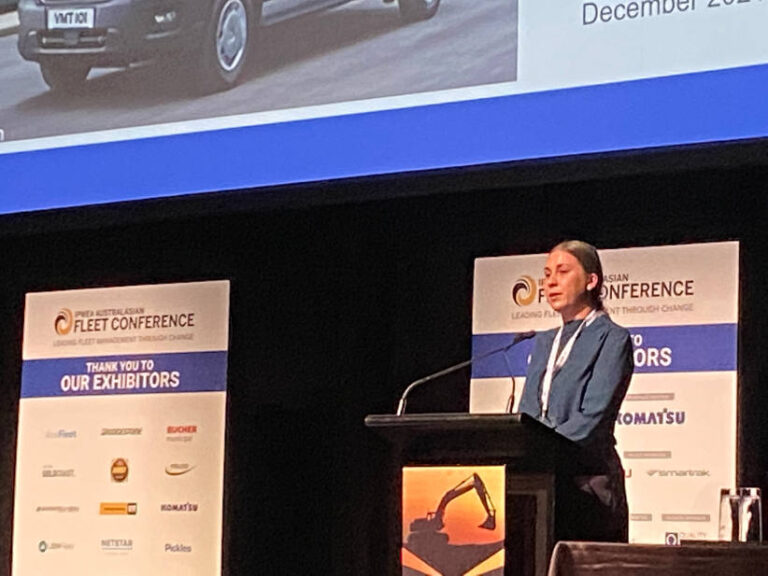COVID induced supply constraints, higher new and used-vehicle prices, an uptick in the take-up of electric vehicles, and surging fuel prices were key themes for the Australian fleet industry in 2022, said Breehan Allen, Business Development Manager at Summit Fleet Leasing and Management, in her keynote address at the IPWEA Fleet Conference in late March.
And another thing, data. “Data, data, data,” said Allen, a self-proclaimed data nerd. “My favourite saying would have to be if you can’t measure it, you can’t manage it.” Collecting and analysing fleet data will help to provide operators with an understanding of fleet trends. It can also result in huge savings, from detecting the cheapest local fuel prices for drivers to seeing connections between driver routines and accidents.
She cited an example of saving a client a motza in insurance excess by identifying and understanding accidents by the time and day of the week. A lot of reverse-parking incidents was put down to the company’s weekly sales meetings. Everyone was rushing to and from this meeting with a number of drivers hitting each other and poles in the making. By understanding these trends, a simple change in the timing of the sales meeting saved serious cash.
In another anecdote, a customer with some 150 vehicles in its fleet saved $80,000 a year on fuel by identifying the cheapest service stations on a per state/per site basis. Allen urged the audience of fleet managers to get onto state-based government apps or national apps such as MotorMouth, Fuel Map and Petrol Spy, or the ACCC website, to analyse their multi-brand fuel cards, and to get drivers to fill up at the servo offering the lowest prices, at the bottom of the weekly fuel price cycle, to save the business costs.
“You can very easily see a five-to-10-cent per litre difference by utilising these apps, sometimes more. It’s very beneficial to understand this, actively communicating this information to your drivers to benefit your business,” said Allen.
Turning to vehicle acquisition, Allen said, amid delays in getting vehicles of choice, that a lot of fleets were considering buying whatever they could get. If she could have a dollar for every time she’d heard such a comment, well, she’d be a wealthy woman, she reckoned.
She talked about COVID and chip shortages causing OEM factory shutdowns and the resulting lengthening in lead-times, rise in vehicle prices and withdrawal of dealer and brand incentives.
“The reality is, as long as the end-user demand exceeds production volume there’s really no need for OEMs to incentivise buyers,” said Allen.
Still, “I’d really recommend benchmarking vehicles in order to choose the models of choice that are going to be fit-for-purpose and cost effective for your future fleets. The key now is to forward order, forward plan and work closely with your manufacturers or dealers, suppliers, your body builders in managing new vehicle deliveries,” said Allen, adding that those relationships have never been more important than they are today and that she was working on 12-month orders for Summit customers.
On the topic of electric vehicles, Allen asked the audience to raise their hand if they’d driven an EV. Almost everyone did. Allen may have been the first to raise the subject, as she was the first speaker. Every speaker after her mentioned it. I spoke to one delegate on the side who said they weren’t compelled by the trend.
To be sure, there’s no doubt that the introduction of EVs into Australian fleets is now considered an imperative. Boards of directors are demanding it, company and local government clients want to see it, and fleet managers want to get on the learning curve.
“The market really has shifted to a greener future and the upward trend will continue,” said Allen, referring to statistics from The Electric Vehicle Council of some 20,665 EV sales in Australia in the year ended February 2022, a trebling from the year earlier.
“This increase represents a market share of 1.95 percent,” said Allen. “It’s clear Australians want electric vehicles, and we’re also not going to have much of a choice in the coming decades.”
Allen said she didn’t expect the federal government to introduce any rebates or fuel efficiency standards as part of its imminent election campaign. “This is what’s needed to really skyrocket electric vehicle sales. Australia is actually the only developed nation in which the federal government is not driving change to EVs. Here, rather, it’s the industry, suppliers, consumers, manufacturers and yourselves (fleet management delegates).”
— Caroline Falls has been a contributor at Fleet Auto News since 2015. She can be contacted at carolinefalls@gmail.com.






